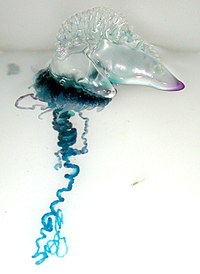
Photo from wikipedia
Simple Summary This study reports the results of a multidisciplinary research on Mediterranean pelagic octopods belonging to the species Argonauta argo, Ocythoe tuberculata, Tremoctopus gracilis and Tremoctopus violaceus for the… Click to show full abstract
Simple Summary This study reports the results of a multidisciplinary research on Mediterranean pelagic octopods belonging to the species Argonauta argo, Ocythoe tuberculata, Tremoctopus gracilis and Tremoctopus violaceus for the first time. The study area was the Strait of Messina and southern Tyrrhenian Sea. We used information from stranding events, accidental fishing catches and stomach contents of large predators (albacore, bluefin tuna, swordfish and Mediterranean spearfish). We analysed 47 fresh octopods, including exceptional records of rare males, and 330 individuals found in the stomachs of 800 predators. The analysis of genetic aspects was used to provide further details on the life and identity of these species. Abstract The present paper represents the first all-encompassing study on all Mediterranean holopelagic octopods belonging to Argonautoidea (Argonauta argo, Ocythoe tuberculata, Tremoctopus gracilis, Tremoctopus violaceus). Argonautoidea octopuses were collected by different sampling methods in the Strait of Messina and southern Tyrrhenian Sea. The aim of this paper was to improve knowledge, using information from different data sources, such as the study of stranded individuals or accidental caught specimens, as well as the analysis of stomach content of large pelagic fishes. Moreover, we investigated their taxonomic profile through the amplification of the mitochondrial cytochrome c oxidase subunit I (COI). Overall, 47 fresh holopelagic octopods were collected, including valuable records of rare males. Moreover, 330 Argonautoidea octopuses were found in the stomachs of 800 predators. The results provided evidence that these cephalopods are more abundant than thought in the past. The molecular approach supported the ecological results with interesting insights. The similarity-based identifications and tree-based methods indicated that three females could be identified as Tremoctopus violaceus in agreement with their morphological classifications. The sequences obtained from the two T. gracilis individuals were clustered with the sequences of Tremoctopus violaceus from the Gulf of Mexico and were differentiated from the sequences attributed to T. gracilis and T. robsoni. The study represents a valuable contribution to the genetic characterization of Mediterranean individuals of the genera Tremoctopus, Argonauta and Ocythoe.
Journal Title: Biology
Year Published: 2023
Link to full text (if available)
Share on Social Media: Sign Up to like & get
recommendations!